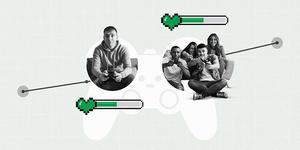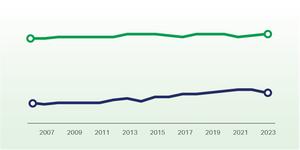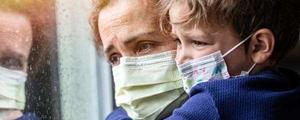Emotions and Mood
Explore Gallup's research.

Video gaming's link to wellbeing depends on connection: Playing in person with family or friends boosts thriving, even among frequent gamers.

Gallup's new report on emotional health shows negative emotions remain far above levels from a decade ago, with implications for global peace and health.

Daily loneliness among U.S. adults has edged up to 20%, its highest level in two years, but remains down from the pandemic high of 25% measured as recently as March 2021.

Adults in the U.S. who have a body mass index (BMI) indicating obesity more often experience negative emotions and perceive more bias against them than those who are not considered obese.

Environmental crises caused by extreme weather or pollution are linked to greater negative emotions and depressive symptoms, as well as less overall life satisfaction among Americans.

Last year, negative emotions fell for the first time since 2014, with experiences of stress, sadness, anger, worry and physical pain each taking a downturn.

A record-high 57% of Americans say they would feel better if they could get more sleep; Americans average a historically low 6.5 hours per night. Stress levels have been rising, especially among young women.

In the majority of countries worldwide, women's wellbeing suffers when they aren't working at their desired capacity.

In addition to not being engaged at work, a new Wellbeing for Planet Earth Foundation-Gallup study shows Japanese workers also are less likely than average to enjoy what they do at work.

U.S. adults who routinely say hello to their neighbors have higher wellbeing than those who greet fewer or no neighbors.

Gallup's latest annual update on how the world feels shows its emotional state stopped getting worse in 2022, but it may be too soon for leaders, organizations and businesses to relax.

Gallup's Emotional Wellbeing Indicator reveals the world's daily experiences, both good and bad.

2020 was the most stressful year in recent history. A record-high 40% of adults worldwide said they experienced stress during a lot of the previous day.

Explore the connection between global peace, wellbeing and health in this report based on 145,000+ interviews across 144 countries and areas.

The World Happiness Report explores the factors contributing to human wellbeing, the happiness ratings of countries and the importance of measuring happiness.

Before the pandemic, the world was already in a more negative emotional state than it had been in years, with scores on Gallup's Negative Experience Index edging slightly higher to 31 in 2019. But no other country in the world was on a more emotional roller coaster than Lebanon.



